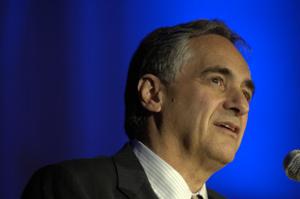|
||
      |
Presidential Q&A
The Magazine interviews University President Robert J. Zimmer. This issue’s topic:
the Odyssey Scholarship program and beyond.
What is most important for alumni to know about Chicago’s financial-aid initiatives?
The University of Chicago has always sought students who could most contribute to and benefit from the distinctive, rigorous, and intense intellectual environment that we foster. The qualities that make students most appropriate for the University cut across the financial capacity of families; ethnic, racial, and religious backgrounds; and nationality. Consequently, it has always been, and continues to be, important for the University to be accessible to these students, and, in particular, to make it possible for students from families of low or modest financial means to attend.

The gift of $100 million has enabled us to launch the Odyssey program to support students in the College. There is an important challenge embedded within this gift, and a further challenge we face in overall financial-aid goals. The $100 million gift has enabled us to launch the Odyssey program with support for 15 years. To make this program permanent, we must raise at least $200 million in endowment. To encourage contributions to financial aid, part of the $100 million is a matching challenge, and the Trustees have added another match for donors contributing to making the Odyssey program permanent. Beyond that, however, we want to do even more than the current Odyssey program allows, and there are additional enhancements to financial aid that we wish to pursue over the long run. This is why we have set a much more ambitious goal for support of this key University priority.
How do you hope that the Odyssey program will affect the University?
The Odyssey program will enable us to make the College more accessible to students regardless of their financial means, and once they are here, to ensure they get the most out of their educational opportunities. We anticipate that this will mean a greater presence and a fuller participation of students with financial need in all aspects of University life. We expect this to enhance what we regard as a fundamental mission—the rigorous engagement of issues and intellectual challenges from the widest variety of perspectives to lead to the fullest analysis and understanding.
Undergraduates are only part of the picture. What’s being done for graduate and professional students?
We have a massive financial commitment to financial aid for graduate and professional school students (about $125 million annually). Despite this commitment, we have many challenges in this area, the nature of which varies across the various academic units of the University. During the past year, we also announced a graduate-aid initiative, which was designed to fundamentally change the structure of our financial aid to doctoral students in the humanities and social sciences and make our commitment to these students, beginning with the class entering in fall 2007, competitive with the best programs in the nation. This was an area in which we had, quite frankly, fallen behind. Support of these students is central to fostering the culture of intense inquiry that has always characterized the University, and must continue to characterize it. It was too important to us not to make a dramatic commitment. This is a very expensive step, and will become more so as we also work in the coming months to include doctoral students in the Divinity School into the program. Unlike the Odyssey program, where all currently enrolled students will have the advantage of the program when it starts in fall 2008, and for which we had the enormous advantage of the $100 million launching gift, we were unfortunately not able to make the full benefit of the graduate-aid initiative program available for current students. We were able to take some steps to improve our commitment to current graduate students, and we are exploring others. We will continue looking for ways to strengthen our financial-aid support for students across the University.